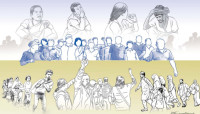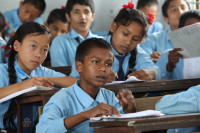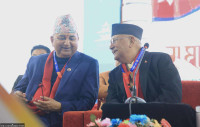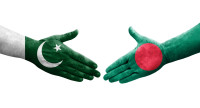Opinion
Case unsettled
I submit that the case of six-year-old Pooja’s rape and subsequent death remains grossly unsettled
Sandhya Regmi
The brutal rape of a six-year old child in her own town in Kalaiya, an especially heinous crime, has emotionally shaken the country, inducing feelings of insecurity in women and female children. Pooja, who was abandoned on a dumping site after the rape, breathed her last on March 8 at the Kanti Children’s Hospital, 18 days after the incident.
The entire nation reacted to the incident with rage and in agony. There were protest rallies, demands for justice, deliberations and solidarity against the violence, peace marches, prayers, and candle-light vigils in Pooja’s memory. The court delivered unusually speedy justice, slapping a 35-year jail term and a Rs 200,000 fine to the rapist, definitely a welcome development. This provided a sense of partial relief to the victim’s family, and of assurance to the people on the state machinery’s capacity to discharge justice.
Issues underlying
Yet, the underlying issues remain widely unsettled. Will justice ever return sweet little Pooja to her mother’s lap? Nothing less is likely to give solace to her heart-broken mother. Only time will tell whether she will ever recover from the trauma. As the mother of a girl child, I put myself in Pooja’s mother’s shoes and fail to fall asleep for hours. Each morning, when I sit down to drink tea with the daily paper in my hands, I have to be prepared to confront more reports of such heinous crimes. A day hardly unfolds without an incident of physical abuse and brutal attacks on women and minor girls. At times, I fail to draw a boundary that could demarcate a safe zone for women and female children—parks, schools, public places, religious places, and even home.
The evils of sexual abuse pervade every corner of society. Out of the 912 rape cases recorded in the year 2070-71BS by the Women and Child Services Directorate of the Nepal Police, 80 victims were reportedly below 10 and 169 in the 11-18 age group. In Tehrathum, a six-year-old child was raped when she went to her neighbour’s place to charge a mobile phone. In Bardiya, a similar incident took place when the mother of a girl had left to collect fodder. In Arghakhanchi, an elderly man of 76 had been sexually abusing an 11-year-old minor for the past 10 months. In Sankhu, a seven-year-old minor who had gone on a picnic was raped by a bus conductor in the vicinity of the Bajrayogini temple. In Dhanusha, a 30-year-old mother living together with her 12-year-old son was gang raped by a group of 10 robbers.
Furthermore, Nepali women are raped and murdered in the Gulf countries and in neighbouring India. A 28-year-old mentally challenged Nepali woman was recently raped and murdered in Rotak in Haryana, India. And these do not even account for the unknown number of cases that go unrecorded, and cases that get buried even before they reach the door of justice.
So, I submit that Pooja’s case remains grossly unsettled and will continue to stand so, until a sense of security is installed in the heart and mind of every child, every girl, and every woman in the country. Installing that sense demands fully addressing the underlying wider issues. But, to address them, leaders of conscience are needed. The sea of solidarity extended by people across the country reflects their desperate call for a leadership that must be capable of addressing the underlying issues.
What is to be done
The task requires the incumbent to deal with issues on multiple fronts at each level: state, society, and individual.
Arguably, the most important task on the list is to devise and implement an education system that fosters a positive mindset, one that recognises and respects life, values, and the rights of every human being, a mindset that regards and plays a role to protect the rights of children, women, and other vulnerable people in society. This calls for the installation of a holistic education system, where morality gets high priority and where everyone becomes aware of their own rights and duties, and about how the law will take its course if anyone breaches their duty. Likewise, adult literacy needs to be redefined and a campaign started that focuses more on educating citizens’ on their rights and duties.
Second, the state should establish an integrated network system of functional access points across the country, where each individual can, freely and with ease, learn and consult human rights matters and report on any rights abuses. Specifically, this calls for installing in each school a counseling desk, led by a well-trained female counsellor, with the authority and duty to report on any rights violations directly to state authorities and the National Human Rights Commission. Similar access points should be installed in each community to serve its members.
Third, the state should review and enhance its institutional capacity to implement legislations in force, so that no one dares abuse the existing legal system. This calls for the installation of system-purifying machineries on a top-to-bottom approach, so that no politician and no state office-bearer dares abuse their position, connections, or office to pervert justice.
The fourth task involves requiring the state to devise and operate adequate an institutional system to rehabilitate victims and affected families. Fifth, the state should review, amend, and supplement related legislations to realise the above tasks. Among others, a fast-track court should be established to deliver speedy justice in cases involving female children and women victims in particular.
Finally, as a citizen and a member of civil society, each of us must continue to serve as a human-rights watchdog. To eliminate such evils completely, all of us must act in a responsible, accountable, and civilised way with due regard to the rights and values of all human beings.
Regmi, an engineer by profession, is a freelance writer ([email protected])




 10.12°C Kathmandu
10.12°C Kathmandu










